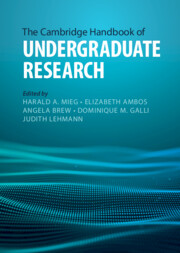Book contents
- The Cambridge Handbook of Undergraduate Research
- The Cambridge Handbook of Undergraduate Research
- Copyright page
- Contents
- Figures
- Tables
- Contributors
- Foreword
- Foreword
- 1 Introduction
- Part I Theory and Research on Undergraduate Research
- Part II Implementation, Approaches, Methods
- Part III Disciplines
- 17 Introduction
- Part III.1 STEM
- Part III.2 Health
- Part III.3 Social Sciences
- 28 Undergraduate Research in Sociology
- 29 Undergraduate Research in Psychology
- 30 Undergraduate Research in Economics
- 31 Undergraduate Research in Political Science
- Part III.4 Humanities
- Part III.5 Arts & Design
- Part III.6 Disciplines A–Z
- Part IV International Perspective
- Part V Avenues for Developing Undergraduate Research
- Index
- References
30 - Undergraduate Research in Economics
from Part III.3 - Social Sciences
Published online by Cambridge University Press: 11 August 2022
- The Cambridge Handbook of Undergraduate Research
- The Cambridge Handbook of Undergraduate Research
- Copyright page
- Contents
- Figures
- Tables
- Contributors
- Foreword
- Foreword
- 1 Introduction
- Part I Theory and Research on Undergraduate Research
- Part II Implementation, Approaches, Methods
- Part III Disciplines
- 17 Introduction
- Part III.1 STEM
- Part III.2 Health
- Part III.3 Social Sciences
- 28 Undergraduate Research in Sociology
- 29 Undergraduate Research in Psychology
- 30 Undergraduate Research in Economics
- 31 Undergraduate Research in Political Science
- Part III.4 Humanities
- Part III.5 Arts & Design
- Part III.6 Disciplines A–Z
- Part IV International Perspective
- Part V Avenues for Developing Undergraduate Research
- Index
- References
Summary
Undergraduate research and inquiry-based learning in economics are on the rise. In this chapter we discuss the benefits and costs of undergraduate research and provide examples of good practice. Our analysis shows that economics students are actively engaged in the research process through various curriculum-based and extracurricular learning opportunities. We also observe that research content is more emphasized than research process in economics students’ inquiry-based learning. Non-curricular research activities are best described by research-tutored activities according to the Healey model. Using the literature of distinguished economists and similar writing-based activities remains the most popular inquiry-based learning model in economics.
Keywords
- Type
- Chapter
- Information
- The Cambridge Handbook of Undergraduate Research , pp. 293 - 302Publisher: Cambridge University PressPrint publication year: 2022



